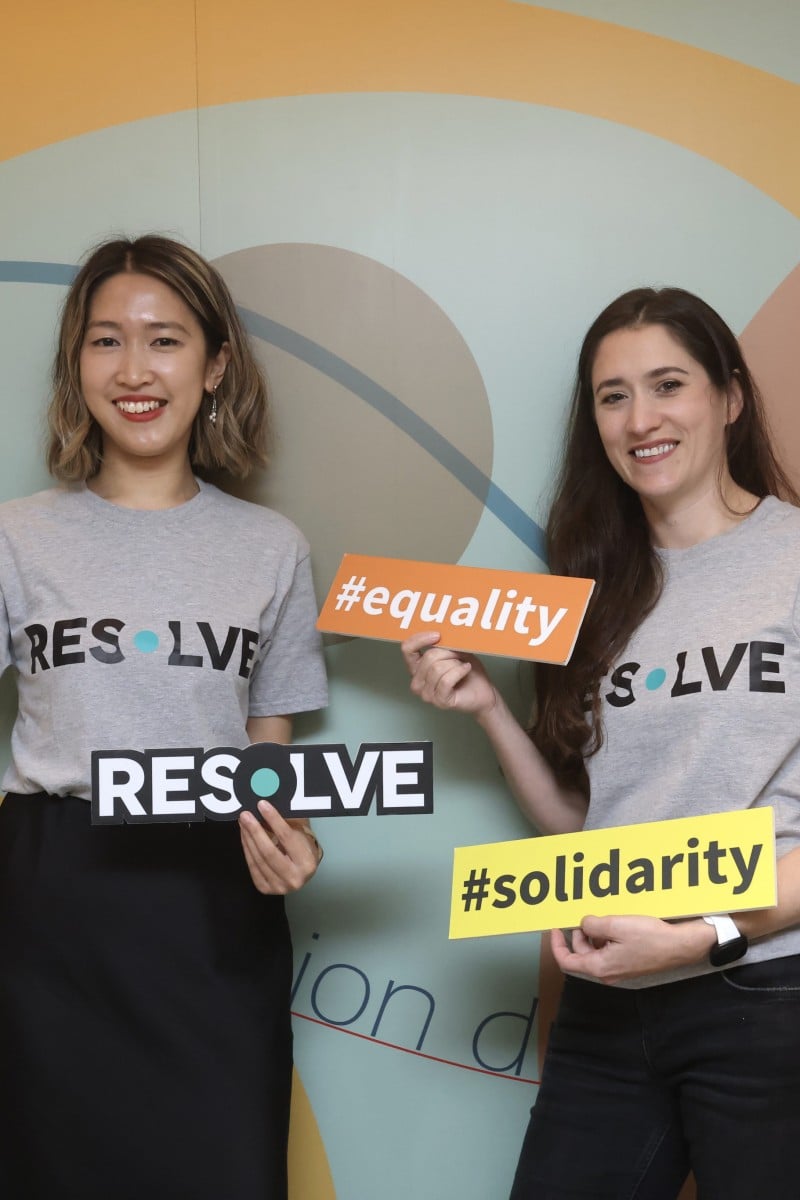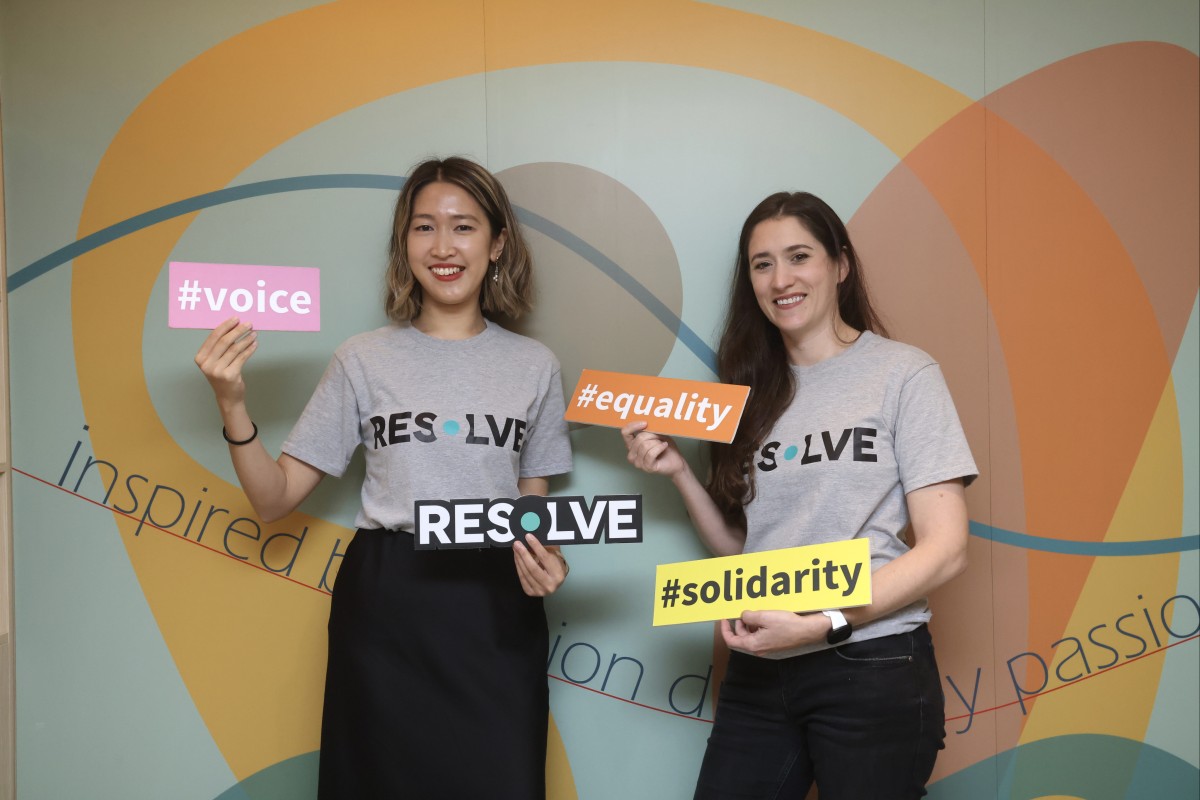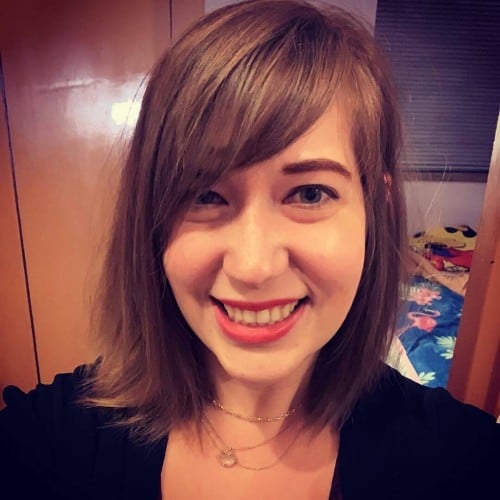
‘Included, respected, valued’: Resolve, an NGO making Hong Kong more inclusive for marginalised groups
- Charity’s latest project is #StepUpNow, a series of animated videos that teach young people how to be active bystanders and step up when they see discrimination
- Founded in 2017, Resolve organises an annual fellowship programme that trains potential leaders to achieve social change for their communities
 Kelly Shek (left) is Resolve’s assistant communications manager, and Victoria Wisniewski Otero is the founder and CEO. Photo: Jonathan Wong
Kelly Shek (left) is Resolve’s assistant communications manager, and Victoria Wisniewski Otero is the founder and CEO. Photo: Jonathan WongWhat would you do if you saw someone being harassed on the street? If you witnessed a person being called a slur or stopped from entering a shop simply because of their race, religion or gender, how would you respond?
It can be hard to know what to do when you see discrimination happening – which is why one Hong Kong NGO wants to teach you how to take action.
“A global organisation called Right to Be found that 79 per cent of people said it improved a situation when a person intervened to stop harassment, but only 25 per cent said someone helped them,” said the founder and CEO of Resolve, Victoria Wisniewski Otero. “So that’s the gap we’re hoping to address.”
Founded in 2017, Resolve’s mission is to make the city more inclusive by providing an empowering platform to unite and amplify the voices of marginalised groups.
“Exclusion isn’t just about income. It’s also about feeling like you belong in society and can be who you are ... like you can be included, respected, valued,” the founder said.
Hong Kong Shifts tells stories of city’s overlooked workers to build community
One of the world’s most unequal cities
Wisniewski Otero was born in Spain and grew up in the US. Now in her 30s, she has been part of Hong Kong’s non-profit sector since 2013, where she has noticed the stark disparities between the rich and poor.
Eventually, this led her to founding Resolve: “Hong Kong is [one of] the most unequal cities in the developed world. And there are lots of different NGOs in the ecosystem trying to, in their own way, address this.”
“One of the areas where I felt Resolve could add value is ... bringing different members of minority groups together, to have more voice, to be able to feel empowered to achieve social change for their communities,” she said.
A key component of Resolve is its fellowship which facilitates leadership development, rights awareness and campaigning skills for potential leaders. The annual programme includes group workshops, peer sharing and mentoring to help fellows on their journeys.
Resolve’s first fellowship in 2018 revolved around the theme of racial equality and inclusion. This inspired the NGO to launch a storytelling campaign in 2018 called Everyday Racism, a series of seven videos featuring members of ethnic minority groups as they discuss the discrimination they regularly face in Hong Kong.
In 2021, Resolve received funding from the Equal Opportunities Commission (EOC) to launch the Every Action Matters campaign, encouraging people to stand up against discrimination. With the initiative, the NGO created an equality toolkit, which details how to be an ally and active bystander in the areas of race, gender and disability.
Kelly Shek, Resolve’s assistant communications manager, said the kit was a vital resource that taught people they could – and should – stand up for others.
The Indian Hongkonger YouTuber educating viewers about her culture
“In Chinese, there is a saying that you shouldn’t get involved in another person’s business – you don’t want to stop if you see something happening or intervene because you don’t want to be involved. You don’t know what trouble will come after,” shared Shek.
But with the world more connected than ever, people can see how speaking up makes a difference.
“[With] social media, you learn more about the news and what’s happening in other places. And when you know more about different social issues, you know that actually, you have the power to make change,” Shek said.
‘I’m so tired of it’: Filipino Hongkongers discuss racism in media
Step up now
Following the toolkit’s release, Resolve received more funding from the EOC and turned its focus to students, aiming to create easy-to-understand resources that could help teens learn how to speak up on behalf of others.
The charity’s latest project is #StepUpNow, a series of five short animated videos, in Cantonese with English subtitles, that teach young people how to be active bystanders and step up when they see discrimination, harassment or prejudice taking place. The videos outline five actions: delegate, direct, distract, delay or document.
Shek knows that many students might be nervous about confronting someone directly, so the videos include two passive measures, delay and document, which give less-outspoken bystanders options to help.
The first video, “Delegate”, was launched last Tuesday, and the others will be released throughout March.
“It gives kids a feel of what it’s like to be a bystander and how they can make a change,” Shek said, explaining that each bite-sized video mimics a real-life scenario that students might encounter in Hong Kong.
Wisniewski Otero and Shek said they hoped the videos would teach students how to make everyone feel welcome in this city.
“What makes Hong Kong [unique] ... is its diversity, and this is a heritage that we should cultivate and cherish. And part of doing that is being a good neighbour, friend and fellow resident,” Wisniewski Otero added.
“If we encourage people to be active bystanders, they’re not only helping the person who may be the target of that harassment, discrimination or prejudice ... [but] they’re also role modelling to others about what’s acceptable in society. That has an impact, too.”
bystander 旁觀者
a person who is standing near and watching something that is happening but is not taking part in it
campaigning 發起行動
to organise a series of activities to try to achieve something
delegate 委派
to give a particular job, duty or right to someone else so that they do it for you
discrimination 歧視
practice of treating a person or group less fairly than others
harassed 騷擾
to do or say something that makes a person feel uncomfortable
marginalised 使邊緣化
prevented from taking part fully in social, economic and political life because of a lack of access to rights, resources and opportunities
prejudice 偏見
an unfair and unreasonable opinion or feeling, especially when formed without enough thought or knowledge
slur 侮辱語
an offensive term that shows disrespect to a particular group of people
